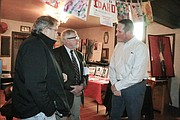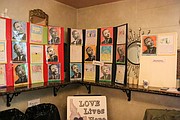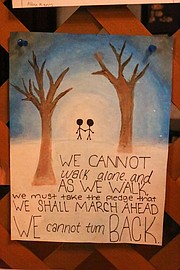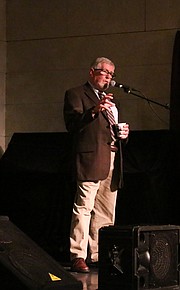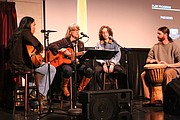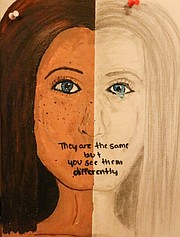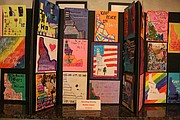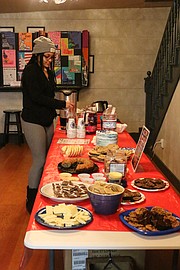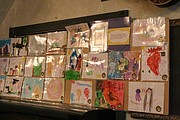Celebrating Martin Luther King Jr. and human rights
BONNERS FERRY — The Boundary County Human Rights Task Force (BCHRTF) hosted its annual celebrating of Martin Luther King Jr. Day on Saturday, Jan. 19. People gathered at The Pearl Theater to enjoy music by local musicians and art displays by students, as they considered human rights issues close to home.
The student artwork decorated the cafe area, and there was an elaborate spread of goodies such as cheese and crackers and home-baked breads and sweets. Local musicians sang and played on the stage, welcoming people as they came through the door.
As the theater filled, the BCHRTF showed a film by the Idaho Public Television called “The Color of Conscience.” The documentary followed the formation of the Kootenai County Task Force on Human Relations as it confronted the Aryan Nation, a white-supremacist/neo-Nazi group.
Following the film was guest speaker, 84-year-old historian and author Robert Singletary, who shared his experiences involving racism from the time he was a youth.
“It was bad, and I am going back and visiting, through a large extent, what I tried to escape from,” said Singletary before his speech.
He stood on stage, no notes or prior planning, and shared candid, emotional stories from his past, moving the audience as the details unfolded.
Singletary began his speech, explaining that he had fled Alaska after the 1964 earthquake.
“It was a frightful experience,” he said about the earthquake, “but in many ways, not as frightful as an idea, as a movement, that takes over people’s minds, how they behave, how they think, their morality, everything that they are.”
He told a story about his childhood in Georgia, when he was eight years old and living and working on a tenant farm for his father.
“I do not often talk about this,” Singletary told the audience.
He met his best friend after a rain caused flooding on a small stream between properties. Both young boys were checking on Singletary’s flutter mill.
“That young black man eventually became my bosom buddy,” said Singletary. “He didn’t know I was white, I didn’t know he was black.”
The story continued, explaining how Singletary was welcomed into his friend’s home for dinner, but when he tried to bring him over to his house, they were told that they must eat outside, away from the family.
“Well I am going to end this story, because I know you have had a long evening, but this story does not end well,” said Singletary to the captivated audience.
On the way home one day, he took a different route and could hear a commotion, people having fun, and one cry of distress.
“When I got into the clearing, I could see enough to see that my friend ... they had taken and tied across a log and they had built a fire down near the end of the log, and they were threatening to do serious damage to him,” said Singletary.
“I ran home and told my mom what was going on,” he continued. “To this day, I can still feel her finger on my chest and her saying to me, ‘Don’t you ever tell anybody what you saw today.’”
The next morning he ran to his friend’s house, only to find the whole family gone. He never saw them again.
Singletary ended the speech after sharing more stories, and encouraged audience participation. He asked them how do you change something that is so embedded into society? Hands were raised and the conversation ensued around the theater, from the floor to the balcony.
At the end, the musicians and singers, Barb Robertson, India Rain, Paul Bonnell, and Josh Sherven, took to the stage again.
“I think that is very important to have an event about human rights in our current society and I think it is important to recognize everybody,” said Sherven about what brought him out to play. “I think music is a great way to do that.”
People wandered through the student art displays, or engaged in conversation about the events of the day, and what brought them out to support the BCHRTF.
“I am here to support the Human Rights Task Force and to celebrate Martin Luther King day,’ said Bonners Ferry Mayor David Sims. “I think it is important for our city and for our country to honor Martin Luther King and the things that he stood for.”
Boundary County K-8 Art Instructor and BCHRTF member Dawn Wagner organized the student art project.
“Every year I have had my students do a project around human rights, so it has been a different project every year,” Wagner explained. “This year our human rights group decided to focus on north Idaho, and our theme this year is Human Rights Begins at Home.”
“We talk about human rights leaders,” she said. “This year we talked about, not just advocating for human rights leaders, but learning about human rights violators, because we need to know why human rights is so important. We need to know about the people who violate human rights also, as well as the ones who step up for human rights. I think it is a huge issue”
“I think it is very relevant to today and I think our young people need to know about the past so we can change it for the future,” said Wagner.













